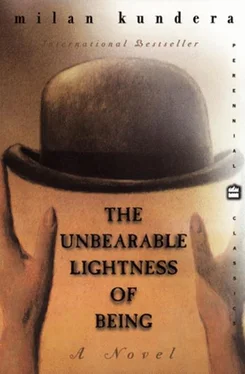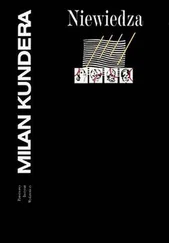Milan Kundera - The Unbearable Lightness of Being
Здесь есть возможность читать онлайн «Milan Kundera - The Unbearable Lightness of Being» весь текст электронной книги совершенно бесплатно (целиком полную версию без сокращений). В некоторых случаях можно слушать аудио, скачать через торрент в формате fb2 и присутствует краткое содержание. Жанр: Современная проза, на английском языке. Описание произведения, (предисловие) а так же отзывы посетителей доступны на портале библиотеки ЛибКат.
- Название:The Unbearable Lightness of Being
- Автор:
- Жанр:
- Год:неизвестен
- ISBN:нет данных
- Рейтинг книги:3 / 5. Голосов: 2
-
Избранное:Добавить в избранное
- Отзывы:
-
Ваша оценка:
- 60
- 1
- 2
- 3
- 4
- 5
The Unbearable Lightness of Being: краткое содержание, описание и аннотация
Предлагаем к чтению аннотацию, описание, краткое содержание или предисловие (зависит от того, что написал сам автор книги «The Unbearable Lightness of Being»). Если вы не нашли необходимую информацию о книге — напишите в комментариях, мы постараемся отыскать её.
The Unbearable Lightness of Being — читать онлайн бесплатно полную книгу (весь текст) целиком
Ниже представлен текст книги, разбитый по страницам. Система сохранения места последней прочитанной страницы, позволяет с удобством читать онлайн бесплатно книгу «The Unbearable Lightness of Being», без необходимости каждый раз заново искать на чём Вы остановились. Поставьте закладку, и сможете в любой момент перейти на страницу, на которой закончили чтение.
Интервал:
Закладка:

Milan Kundera
The Unbearable Lightness of Being
Translated from the Czech by Michael Henry Heim
© 1982
PART ONE . Lightness and Weight
1
The idea of eternal return is a mysterious one, and Nietzsche has often perplexed other philosophers with it: to think that everything recurs as we once experienced it, and that the recurrence itself recurs ad infinitum! What does this mad myth signify?
Putting it negatively, the myth of eternal return states that a life which disappears once and for all, which does not return, is like a shadow, without weight, dead in advance, and whether it was horrible, beautiful, or sublime, its horror, sublimity, and beauty mean nothing. We need take no more note of it than of a war between two African kingdoms in the fourteenth century, a war that altered nothing in the destiny of the world, even if a hundred thousand blacks perished in excruciating torment.
Will the war between two African kingdoms in the fourteenth century itself be altered if it recurs again and again, in eternal return?
It will: it will become a solid mass, permanently protuberant, its inanity irreparable.
If the French Revolution were to recur eternally, French historians would be less proud of Robespierre. But because they deal with something that will not return, the bloody years of the Revolution have turned into mere words, theories, and discussions, have become lighter than feathers, frightening no one. There is an infinite difference between a Robespierre who occurs only once in history and a Robespierre who eternally returns, chopping off French heads.
Let us therefore agree that the idea of eternal return implies a perspective from which things appear other than as we know them: they appear without the mitigating circumstance of their transitory nature. This mitigating circumstance prevents us from coming to a verdict. For how can we condemn something that is ephemeral, in transit? In the sunset of dissolution, everything is illuminated by the aura of nostalgia, even the guillotine.
Not long ago, I caught myself experiencing a most incredible sensation. Leafing through a book on Hitler, I was touched by some of his portraits: they reminded me of my childhood. I grew up during the war; several members of my family perished in Hitler's concentration camps; but what were their deaths compared with the memories of a lost period in my life, a period that would never return?
This reconciliation with Hitler reveals the profound moral perversity of a world that rests essentially on the nonexistence of return, for in this world everything is pardoned in advance and therefore everything cynically permitted.
2
If every second of our lives recurs an infinite number of times, we are nailed to eternity as Jesus Christ was nailed to the cross. It is a terrifying prospect. In the world of eternal return the weight of unbearable responsibility lies heavy on every move we make. That is why Nietzsche called the idea of eternal return the heaviest of burdens (das schwerste Gewicht).
If eternal return is the heaviest of burdens, then our lives can stand out against it in all their splendid lightness.
But is heaviness truly deplorable and lightness splendid?
The heaviest of burdens crushes us, we sink beneath it, it pins us to the ground. But in the love poetry of every age, the woman longs to be weighed down by the man's body. The heaviest of burdens is therefore simultaneously an image of life's most intense fulfillment. The heavier the burden, the closer our lives come to the earth, the more real and truthful they become.
Conversely, the absolute absence of a burden causes man to be lighter than air, to soar into the heights, take leave of the earth and his earthly being, and become only half real, his movements as free as they are insignificant.
What then shall we choose? Weight or lightness?
Parmenides posed this very question in the sixth century before Christ. He saw the world divided into pairs of opposites:
light/darkness, fineness/coarseness, warmth/cold, being/non-being. One half of the opposition he called positive (light, fineness, warmth, being), the other negative. We might find this division into positive and negative poles childishly simple except for one difficulty: which one is positive, weight or lightness?
Parmenides responded: lightness is positive, weight negative.Was he correct or not? That is the question. The only certainty is: the lightness/weight opposition is the most mysterious, most ambiguous of all.
3
I have been thinking about Tomas for many years. But only in the light of these reflections did I see him clearly. I saw him standing at the window of his flat and looking across the courtyard at the opposite walls, not knowing what to do.
He had first met Tereza about three weeks earlier in a small Czech town. They had spent scarcely an hour together. She had accompanied him to the station and waited with him until he boarded the train. Ten days later she paid him a visit. They made love the day she arrived. That night she came down with a fever and stayed a whole week in his flat with the flu.
He had come to feel an inexplicable love for this all but complete stranger; she seemed a child to him, a child someone had put in a bulrush basket daubed with pitch and sent downstream for Tomas to fetch at the riverbank of his bed.
She stayed with him a week, until she was well again, then went back to her town, some hundred and twenty-five miles from Prague. And then came the time I have just spoken of and see as the key to his life: Standing by the window, he looked out over the courtyard at the walls opposite him and deliberated.
Should he call her back to Prague for good? He feared the responsibility. If he invited her to come, then come she would, and offer him up her life.
Or should he refrain from approaching her? Then she would remain a waitress in a hotel restaurant of a provincial town and he would never see her again.
Did he want her to come or did he not?
He looked out over the courtyard at the opposite walls, seeking an answer.
He kept recalling her lying on his bed; she reminded him of no one in his former life. She was neither mistress nor wife. She was a child whom he had taken from a bulrush basket that had been daubed with pitch and sent to the riverbank of his bed. She fell asleep. He knelt down next to her. Her feverous breath quickened and she gave out a weak moan. He pressed his face to hers and whispered calming words into her sleep. After a while he felt her breath return to normal and her face rise unconsciously to meet his. He smelled the delicate aroma of her fever and breathed it in, as if trying to glut himself with the intimacy of her body. And all at once he fancied she had been with him for many years and was dying. He had a sudden clear feeling that he would not survive her death. He would lie down beside her and want to die with her. He pressed his face into the pillow beside her head and kept it there for a long time.
Now he was standing at the window trying to call that moment to account. What could it have been if not love declaring itself to him?
But was it love? The feeling of wanting to die beside her was clearly exaggerated: he had seen her only once before in his life! Was it simply the hysteria of a man who, aware deep down of his inaptitude for love, felt the self-deluding need to simulate it? His unconscious was so cowardly that the best partner it could choose for its little comedy was this miserable provincial waitress with practically no chance at all to enter his life!
Читать дальшеИнтервал:
Закладка:
Похожие книги на «The Unbearable Lightness of Being»
Представляем Вашему вниманию похожие книги на «The Unbearable Lightness of Being» списком для выбора. Мы отобрали схожую по названию и смыслу литературу в надежде предоставить читателям больше вариантов отыскать новые, интересные, ещё непрочитанные произведения.
Обсуждение, отзывы о книге «The Unbearable Lightness of Being» и просто собственные мнения читателей. Оставьте ваши комментарии, напишите, что Вы думаете о произведении, его смысле или главных героях. Укажите что конкретно понравилось, а что нет, и почему Вы так считаете.












